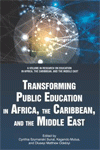
Transforming Public Education in Africa, the Caribbean, and the Middle East
Edited by:
Cynthia S Sunal, University of Alabama
Kagendo Mutua, University of Alabama
Oluseyi Matthew Odebiyi, Arizona State University
A volume in the series: Research on Education in Africa, the Caribbean, and the Middle East. Editor(s): Cynthia S Sunal, University of Alabama. Oluseyi Matthew Odebiyi, Arizona State University. Kagendo Mutua, University of Alabama.
Published 2019
Public education has expanded to serve large populations across the regions of Africa, the Caribbean, and the Middle East. Many nations in these regions are moving into a phase of public education in which a variety of factors are being identified as influencing the quality of public education and its ability to serve all children and adolescents. It has become evident that ethnic background, gender, religious affiliation, and ability/disability are important factors in who is served and how well the individual is served. The chapters in this volume, Book 8, of Research on Education in Africa, the Caribbean, and the Middle East document and describe the status, success, and limitations of public education’s efforts at transformation. They provide points from which further research and practice might occur.
CONTENTS
Introduction: How has Education Been Transformed in Africa, the Caribbean, and the Middle East? Cynthia Szymanski Sunal and Kagendo Mutua. PART I: Free Primary Education in Sierra Leone and Its Impact on Literacy Rates, Colin Cannonier and Monica Galloway Burke. How School Autonomy Restricts Equitable Access for South African Learners, Daniel Kiel and Kevin Teise. Transforming Early Childhood Development and Education in Kwale County, Kenya, Tata Mbugua, Branislav Pupala, Ondrej Kascak, and Zuzana Petrova. Transformative Female Voices in Rural South African Schools: An Asset-Based Perspective, Fumane Portia Khanare, Brenda Louise Hammett Marina. Reflection on Leadership Experience: Zimbabwean School Leaders Cultivating their own Learning, Trevor Ngorosha. Women and School Leadership in Tanzania: A Paradox of Access and Agency, Godfrey Telli and Corrie Stone-Johnson. Basic Education in Morocco: The Struggle for Decentralization and Gender Equity, Randal Joy Thompson. PART II: Frameworks Used for Understanding Academic Motivation Within the English-Speaking Caribbean, Anica Bowe and Martin Timothy Hall. Achievement Goals and High-Stakes Test Anxiety in Standards 5 Students in Trinidad, Melissa R. Hunte, Joan M. Martin, and Todd M. Milford. Exploring Educational Opportunities toward Gender Equity for Girls in Haiti, Steve Sider, Charlene Desir, Gaetane Jean-Marie, and Allyson Watson. PART III: Living in a Visual World: Israeli Arab Teachers’ Visual Representation Transformations and Related Competencies, Billie Eilam and Seena Yasin Omar. Education and Indoctrination in the Islamic Republic of Iran, Khodadad Kaviani. Parents’ Perception of Public Education in Amman, Jordan, Randa Suleiman. Epilogue: Education Research in the 21st Century, Mwarumba Mwavita. About the Authors.
-
Paperback9781641135702
Web price: $45.04 (Reg. 52.99)
-
Hardcover9781641135719
Web price: $80.74 (Reg. 94.99)
- eBook9781641135726

- EDU000000 - EDUCATION: General
- EDU001000 - EDUCATION: ADMINISTRATION: General
- EDU043000 - EDUCATION: Comparative
-
 Advances in Special Education Research and Praxis in Selected Countries of Africa, Caribbean and the Middle East
Advances in Special Education Research and Praxis in Selected Countries of Africa, Caribbean and the Middle East
-
 Crosscurrents and Crosscutting Themes
Crosscurrents and Crosscutting Themes
-
 Effects of Government Mandates and Policies on Public Education in Africa, the Caribbean, and the Middle East
Effects of Government Mandates and Policies on Public Education in Africa, the Caribbean, and the Middle East
-
 Research on Education in Africa, the Caribbean, and the Middle East
An Historic Overview
Research on Education in Africa, the Caribbean, and the Middle East
An Historic Overview
-
 Research on the Influences of Educational Policy on Teaching and Learning
Research on the Influences of Educational Policy on Teaching and Learning
-
 The Enterprise of Education
The Enterprise of Education
-
 Undertaking Educational Challenges in the 21st Century
Research from the Field
Undertaking Educational Challenges in the 21st Century
Research from the Field

